|
|
|
Sort Order |
|
|
|
Items / Page
|
|
|
|
|
|
|
| Srl | Item |
| 1 |
ID:
175038


|
|
|
|
|
| Summary/Abstract |
To meet the Paris Agreement, Mexico is committed to reduce unconditionally 25% of its greenhouse gases emissions for the year 2030. Since the strategy to achieve the mitigation goals needs an increase in renewable energy sources, Mexico’s national climate change policy package has already been launched, including the deployment of 13.5 GW of wind, 1 of biomass, 0.7 of geothermal, 1.75 of hydropower and 10.4 of solar energy in the period 2018–2030. However, these green investments planned are below the scenario proposed by IRENA compatible with the Paris Agreement. This paper assesses Mexico’s green investments for the period 2018–2030 in terms of value added, employment, materials, land use, water and CO2eq emissions in a multiregional input-output framework and compare the results with the IRENA proposal. These green investments are expected to account for nearly an increase of 1% both of GDP and employment in Mexico and an expected mitigation of around 63 Mt CO2eq, once the new facilities are fully deployed. Nevertheless, the deployment and operation and maintenance phases will increase the emissions (0.82%), the water and material footprint (0.19 and 0.9%, respectively) and the land use (0.19%) with a substantial share of the positive and negative effects leakaged outside.
|
|
|
|
|
|
|
|
|
|
|
|
|
|
|
|
| 2 |
ID:
125513
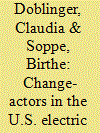

|
|
|
|
|
| Publication |
2013.
|
| Summary/Abstract |
We study the contribution of environmental groups to new technology adoption and diffusion by dominant incumbents. Building on institutional and social movement theory, we develop a theoretical framework that sheds light on environmental groups as change-actors. We theorize that by approaching embedded key constituents with various strategic actions, environmental groups affect taken-for-granted beliefs, build legitimacy for renewable energy technologies, and convince skeptical constituents to support the new technology. We verify our theoretical framework with a case study of wind power development in Colorado. We find that environmentalists educate constituents on the benefits of the new technology, engage in activities leading to regulatory and legislative decisions for wind, while also providing direct assistance to the utility. As a result, utilities are both pressured and encouraged to adopt and diffuse wind power on a large-scale. This research directs attention to the role of environmental groups as change-actors and the legitimating effects of their actions. It highlights their part in creating a more favorable institutional environment for new technologies while directly influencing the incumbent?s technology choice. This paper contributes to an understanding of bottom-up, actor-initiated changes in energy systems taking into account both the systemic technological infrastructure and the institutional context.
|
|
|
|
|
|
|
|
|
|
|
|
|
|
|
|
| 3 |
ID:
107625
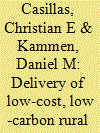

|
|
|
|
|
| Publication |
2011.
|
| Summary/Abstract |
The provision of both electrical and mechanical energy services can play a critical role in poverty alleviation for the almost two billion rural users who currently lack access to electricity. Distributed generation using diesel generators remains a common means of electricity provision for rural communities throughout the world. Due to rising fuel costs, the need to address poverty, and consequences of global warming, it is necessary to develop cost efficient means of reducing fossil fuel consumption in isolated diesel microgrids. Based on a case study in Nicaragua, a set of demand and supply side measures are ordered by their annualized costs in order to approximate an energy supply curve. The curve highlights significant opportunities for reducing the costs of delivering energy services while also transitioning to a carbon-free electrical system. In particular, the study demonstrates the significant cost savings resulting from the implementation of conventional metering, efficient residential lighting, and electricity generation using renewable energy sources.
|
|
|
|
|
|
|
|
|
|
|
|
|
|
|
|
| 4 |
ID:
097442


|
|
|
|
|
| Publication |
2010.
|
| Summary/Abstract |
Bangladesh has good potential for harnessing renewable energy sources such as solar, biomass, wind, and mini-hydropower. The country has been experiencing a gradual shift towards exploring renewable energy resources as a driving force for rural development. A few public sector and non-government organizations have started to develop renewable energy technology (RET) projects in rural areas. The lessons learnt from different demonstrations of RET projects reveal that with careful forward planning renewable energy can provide far-reaching economic, environmental, and social benefits to people living in remote rural areas in Bangladesh. This paper identifies some of the barriers that need to be overcome for the successful development of renewable energy technology sector and betterment of rural livelihoods. It does so through a critical review of policy and institutional settings, as well as present status and lessons learnt from pilot demonstration of a number of RET projects undertaken by different organizations. The study highlights policy implications of the review with the aim of supporting decision makers in formulating renewable energy policies and future plans for Bangladesh.
|
|
|
|
|
|
|
|
|
|
|
|
|
|
|
|
| 5 |
ID:
097486


|
|
|
|
|
| Publication |
2010.
|
| Summary/Abstract |
Bangladesh has good potential for harnessing renewable energy sources such as solar, biomass, wind, and mini-hydropower. The country has been experiencing a gradual shift towards exploring renewable energy resources as a driving force for rural development. A few public sector and non-government organizations have started to develop renewable energy technology (RET) projects in rural areas. The lessons learnt from different demonstrations of RET projects reveal that with careful forward planning renewable energy can provide far-reaching economic, environmental, and social benefits to people living in remote rural areas in Bangladesh. This paper identifies some of the barriers that need to be overcome for the successful development of renewable energy technology sector and betterment of rural livelihoods. It does so through a critical review of policy and institutional settings, as well as present status and lessons learnt from pilot demonstration of a number of RET projects undertaken by different organizations. The study highlights policy implications of the review with the aim of supporting decision makers in formulating renewable energy policies and future plans for Bangladesh.
|
|
|
|
|
|
|
|
|
|
|
|
|
|
|
|
| 6 |
ID:
094958


|
|
|
|
|
| Publication |
2010.
|
| Summary/Abstract |
The GHGs emmited by using conventional energy sources rapid industrialization and development in hills, are contributing global warming, which has resulted in melting of glaciers located in the state at the rate of 0.3-20 m2 per year as per recent studies. The shrinking of glaciers, which are the main source of water of Himalayan rivers, can have an adverse impact on the future of hydro-power projects, many of which may become non-functional during next 40-50 years if the current trend of melting of glaciers continues and the other renewable energy sources are required to be tapped to supplement the declining hydro-electricity generation. The energy consumption for cooking, lighting and space heating in the Western Himalayan Indian state of Himachal Pradesh, is highest in the northern India. The fuelwood consumption constitutes about 52% of the total energy consumption of the state. About 2.7 h per person per trip in the rural areas, are spent for the collection of fuelwood mainly during winters. A number of options and potential of renewable energy sources for cooking, heating and lighting in the state have been discussed. The future policy interventions in the energy sector are also presented.
|
|
|
|
|
|
|
|
|
|
|
|
|
|
|
|
| 7 |
ID:
118049
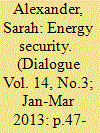

|
|
|
| 8 |
ID:
104820


|
|
|
| 9 |
ID:
124223
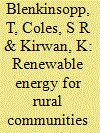

|
|
|
|
|
| Publication |
2013.
|
| Summary/Abstract |
The desire for universal access to modern energy and the use of renewable energy technologies (RETs) as a means of delivering low carbon solutions are driven by several local and global factors, including climate change, population increase and future energy security. Social attitudes are a major challenge to overcome in order to successfully introduce low carbon technologies as a sustainable alternative to more traditional means of energy provision. It becomes a challenge to educate the target population in order to counteract any negative preconceptions or scepticisms in using these technologies which can have adverse effect upon their viability and long term success. This work presents the results of a rural energy survey conducted in the Indian state of Maharashtra. The survey highlights the opportunities and attitudes of these rural communities towards sustainable modern energy services and the technologies used to deliver them. Results from the survey show that there is interest in using sustainable or renewable technologies for energy provision and suggest that cost, reliability and ease of use are more important factors than the environmental benefits. A suggestion for a way to improve RET adoption in rural communities is also presented based on the results of this study.
|
|
|
|
|
|
|
|
|
|
|
|
|
|
|
|
| 10 |
ID:
113430
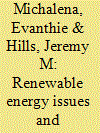

|
|
|
|
|
| Publication |
2012.
|
| Summary/Abstract |
The European Commission has set renewable energy (RE) targets at the Member State (MS) level, however, at the local scale there are many issues related to renewable energy implementation. In this work, a meta-analysis of European RE generation issues from international scientific literature was carried out. Fifty-four local RE implementation issues were identified. Five main clusters of issues were determined, some were aligned along sectoral lines (e.g., governance and technology) but others were inherently multi-sectoral (e.g., complexity and multiplicity of factors), challenging the traditional sectorial view. Results show that RE issues are not just a finite list of independent issues but are hierarchical, multi-scale and cross-linked. As a further step, these issues clusters were linked to the European RE policy and subsidiarity through the National Renewable Energy Action Plans (NREAP) in selected MS. EU policy and NREAP subsidiarity proved limited in their scope in dealing with local RE issues. With this scope, the way that EU policy partially fails to facilitate delivery of RE targets, promotes weak subsidiarity through NREAPs and does not address local issues of RE, is discussed.
|
|
|
|
|
|
|
|
|
|
|
|
|
|
|
|
| 11 |
ID:
137687


|
|
|
|
|
| Summary/Abstract |
Recent decades have witnessed a surge in international programmes established to assist the adoption of renewable energy technologies (RETs) in low and lower-middle income countries. So far, such programmes have yielded mixed success. While partnerships between international, national and local organisations have become the pre-eminent model for RET programmes, we know relatively little about their contribution. This article traces the role of renewable energy partnerships in development cooperation, shifting the analytical emphasis from barriers and drivers to key actors and their relationships. It presents a relational approach for the analysis of development assistance for renewable energy, drawing on theories concerning the role of strong and weak ties in inter-organisational networks. Through an analysis of seven empirical cases from Central America, the article provides insights into how different forms of inter-organisational relationships can facilitate implementation of RET programmes but do not necessarily enhance the capacities of local organisations in a way to support a more sustainable adoption of RETs. On the basis of this analysis, theoretical and policy implications are given concerning the potential of relational approaches for researching technology diffusion processes, and the role of strong and weak ties for the success – or failure – of renewable energy partnerships.
|
|
|
|
|
|
|
|
|
|
|
|
|
|
|
|
| 12 |
ID:
166490


|
|
|
|
|
| Summary/Abstract |
Small-scale renewable energy technologies offer impoverished rural communities in developing countries the ability to overcome extreme poverty and improve their living conditions. Unfortunately, most presented frameworks for rural electrifications have not adequately addressed the three cores of energy trilemma. This paper proposes a methodology of rural electrification planning to overcome the three cores of the energy trilemma (environment, security and equity), considering four sustainability dimensions: environmental, technical, socioeconomic and institutional. The proposal is based on a review of the Venezuelan program “Sembrando Luz” (“Sowing Light”), developed between 2005 and 2013, through visits to 28 beneficiary communities. A set of lessons learned were used to define the methodological proposal developed here. This proposal establishes specific objectives for the achievement of sustainability in rural electrification programs, through a novel conceptual framework, valid for the achievement of universal access anywhere in the world. In addition, hierarchical criteria and a projects classification are proposed, which finally enables a projects portfolio to be designed according to the technical and financial conditions available in each country. As a case study, the planning methodology is applied to 2,269 isolated communities in Venezuela that still lack electricity. The methods and conclusions of this work are intended to be a contribution to the improvement of rural electrification programs with renewable energy in other countries of the developing world.
|
|
|
|
|
|
|
|
|
|
|
|
|
|
|
|
| 13 |
ID:
128648


|
|
|
|
|
|
|
|